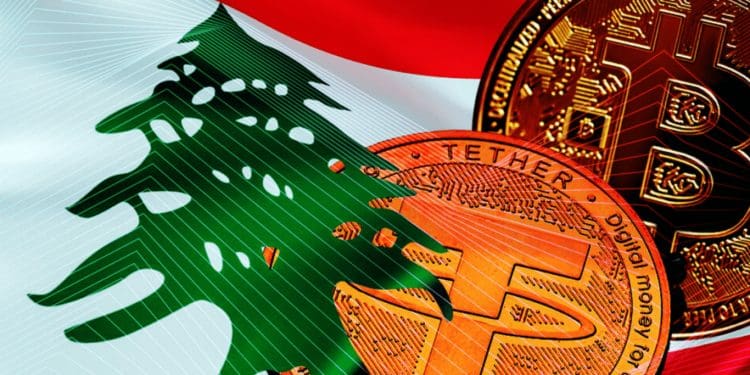With markets plunging into capitulation, Lebanon may have found a loophole to combat price hikes: using tether for purchasing and mining Bitcoin in case fiat goes into shambles. In a CNBC report, many Lebanese citizens consider cryptocurrencies as a backup plan for their economy. Several individuals mine for Bitcoin and major altcoins while simultaneously looking for a lucrative job in the country.
Since 2019, Lebanon kept struggling with the government’s consecutive proposals of taxation from essential resources like gas and water to online services such as Messenger and WhatsApp calls. From the October 17 Revolution of that year to the Beirut explosion of 2020 that killed over 200 people and billions of dollars in damages, central banks limited withdrawals since the COVID-19 pandemic which caused the Lebanese lira (LL) to depreciate from 1,500 LL to $1, down to 40,000 LL to $1.
However, some citizens found their way to escape the 78% population suffering from poverty through Bitcoin mining and using decentralized digital currencies as purchasing power.
Crypto as a Bank and Source of Income
Those caught in the 2019 nationwide crisis had a money problem: banks halted withdrawals and limited how much LL a person could pull out of their accounts. In 2020, some people, such as Ahmad Abu Daher and his friend, were mining for Ether tokens.
According to an interview with CNBC, Abu Daher said he only paid cheap electricity and was “getting fresh dollars through mining” with three machines. Since then, the 22-year-old crypto entrepreneur has built a successful company with over thousands of machines in operation across Lebanon. He and his partner started a hosting business for people who wanted to get into the crypto mining gig but had no technical know-how and access to cheap electricity.
At the time of this writing, the Lebanese government is cracking down on crypto mining farms across the country for taking advantage of the electricity. However, Abu Daher told CNBC that he is not worried about it because he has had talks with the police and has proven that his company uses legal electricity.
Meanwhile, citizens put more faith in crypto cold wallets than the failed central banks. One individual, Marcel Younes, emptied his bank account in 2019 right before LL’s depreciation and halted withdrawals. He put 70% of his money into Bitcoin while keeping cash hidden somewhere. He told his family to do the same right before everything went down in the country. When nobody believed him, all of his family members got involved with the devaluation of the currency.
Younes established a group that helps bring Bitcoin knowledge to the masses called Bitcoin du Liban. He and his team do sessions through their official Telegram group.
These are some of the many stories of people prioritizing crypto over Lebanese pounds as the country continues to struggle with its ongoing battle against fiat depreciation, resource price hikes, societal stability, and central bank issues.
Tether for Everyday Payment
Because of the devaluation of the Lebanese lira, people could not afford the most basic groceries for their monthly consumption. Those with crypto experience and stored Bitcoin use services to liquidate their assets into Tether (USDT) which is pegged to the US dollar.
Some would go to Telegram groups to offer a trade for fiat US dollars. According to the CNBC report, “While tether does not offer the same potential for appreciation as other cryptocurrencies, it represents something more important: a currency that Lebanese still trust.”
Meetups occur in public places to exchange the digital Tether for cold hard dollars. Reports show that Lebanon has a network of “over-the-counter traders” that have available fiat currencies for crypto.
While the Lebanese government prohibits crypto as a payment, businesses began promoting their acceptance of crypto payments via social media. These include restaurants, electronic stores, small grocery stores, coffee shops, and thrift shops.
Crypto Market Still Far from Bull Run
While it may sound quite good to know that countries such as Lebanon, Afghanistan and El Salvador are now using cryptocurrency as an alternative to fiat, the real value of cryptocurrency is yet to be known.
Since the crash of November, many are now speculating this is just the beginning of a series of crashes. To some, this may be an opportunity to buy big and earn significant profits in the future.












